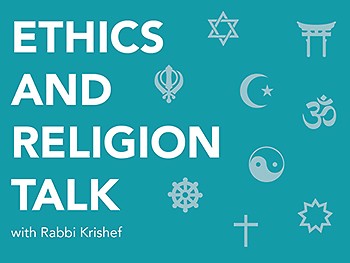Note: In this column, four of the Ethics and Religion Talk panelists discuss this question as it relates to interfaith social relationships and friendships. Next week, three panelists will respond to the question’s implications for romantic relationships.
Rev. Ray Lanning, a retired minister of the Reformed Presbyterian Church of North America, responds:
“Good question for Reformed and Presbyterian Christians! Like other ethnic groups, Scottish and Dutch folk who came to these shores sought out ‘kinsmen according to the flesh’ and flocked together as churches and communities. It is human nature to be gregarious, and sin only enters when flocking together becomes an exercise in shutting others out.
“God sees to it that every day we cross paths with people who do not share our beliefs. Every Christian must acquire the social skills needed to relate to and work with such people. Begin with self-denial; forget about yourself and take an interest in others. Good manners and grace in the heart will open many doors. ‘Let every man be swift to hear, slow to speak, slow to wrath’ (James 1:19).
“In multi-faith situations, such as this column, each one must have freedom to speak honestly, as a representative of a faith community (Thanks, Rabbi!). Each one must be ready to hear what the others have to say. A good rule is, each of us bring the riches of our own tradition to bear on answering the question proposed, and let readers critique the various answers.
“Reformed Christians have great freedom. Faith in the truth of God’s Word frees us from having to prove it to others. Reliance on the work of the Holy Spirit frees us from having to force our views on others. We can listen, we can learn, and we should cherish all that is true, honest, just, lovely, of good report, virtuous, or worthy of praise in people of other faiths (Philippians 4:8).”
Fred Stella, the Pracharak (Outreach Minister) for the West Michigan Hindu Temple, responds:
“My interfaith relationships are really no different from any others. Most of the relationships I have are with those outside the Hindu fold. It is very rare that any issues come up which cause dissonance. If the subject of religion surfaces it is important for everyone involved to listen, respect and proceed with polite honesty. Remember that most of what we might disagree about is improvable. A sense of humility about the opinions we hold goes a long way.
“Hinduism has a long history of accepting the wisdom of other faiths. This doesn’t mean we have to agree with everything about another theology, or mindlessly say, ‘All religions are the same.’ It simply means that we believe that any sincere attempt to know Truth and live a compassionate life is rewarded.”
Father Kevin Niehoff, O.P., a Dominican priest who serves as Adjutant Judicial Vicar, Diocese of Grand Rapids, responds:
“The Catholic Church recognizes that ‘many elements of sanctification and of truth are found outside the visible confines of the Catholic Church…’ (Catechism of the Catholic Church, p. 216). The Church recognizes that ‘the Christ’s Spirit uses these Churches and ecclesial communities as means of salvation, whose power derives from the fullness of grace and truth that Christ has entrusted to the Catholic Church.’
“The direct response to this question is to recognize and welcome truth wherever it lies. No one ‘Church’ or faith tradition possesses all truth. Interfaith or multi-faith relationships are both a blessing and a challenge. When one recognizes the human dignity of the person who holds to a different faith tradition then dialogue may begin. One may then find more in common than difference.”
Dr Sahibzada, the Director of Islamic Center and Imam of the Mosque of Grand Rapids, responds:
“Inter- and multi-faith relationship must be handled through tolerance, patience and an approach to commonalities. Developing relationships wisely with all humans is the struggle to achieve the best of humanity and faith. Differences of opinion must not lead to enmity. Life is sacred, the most valuable God-given gift, and it must not be taken away except by application of the Law.
“Listening to others’ opinions and not reacting in a prejudicial manner is a basic key to coming closer to each other. Avoid mockery of their ideas and degradation of their practices, as done by comedians in media like Bill Maher’s criticism of religion. Respect others with dignity and honor if you want to be respected and honored in same way. A high standard of morals and manners must be applied by flexible handling of issues. If anything comes up during discussion, it must be dealt with wisdom and humility. An application of the above approach will result in best form of inter- and multi-faith relationships.”
This column answers questions of Ethics and Religion by submitting them to a multi-faith panel of spiritual leaders in the Grand Rapids area. We’d love to hear about the ordinary ethical questions that come up in the course of your day as well as any questions of religion that you’ve wondered about. Tell us how you resolved an ethical dilemma and see how members of the Ethics and Religion Talk panel would have handled the same situation. Please send your questions to [email protected].
The Rapidian, a program of the 501(c)3 nonprofit Community Media Center, relies on the community’s support to help cover the cost of training reporters and publishing content.
We need your help.
If each of our readers and content creators who values this community platform help support its creation and maintenance, The Rapidian can continue to educate and facilitate a conversation around issues for years to come.
Please support The Rapidian and make a contribution today.
